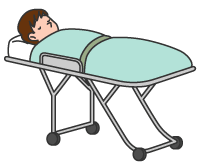 |
When you are unable to walk and require transport for hospitalization
 |
 |
 |
 |
| |
 |
|
 The
full cost of using a motor vehicle, etc. is covered in the event
a doctor confirms that a sickness or injury renders it extremely
difficult for the patient to walk and that transport is required
for hospitalization or transportation from one hospital to another.
This is called "Transportation Expenses." The
full cost of using a motor vehicle, etc. is covered in the event
a doctor confirms that a sickness or injury renders it extremely
difficult for the patient to walk and that transport is required
for hospitalization or transportation from one hospital to another.
This is called "Transportation Expenses."
|
 |
 |
|
 |
| |
|
In order to receive payment to cover transportation expenses,
you must gain the approval of the Health Insurance Society
in advance (or afterwards, if unavoidable circumstances
preclude this).
If you have paid transportation expenses, make sure you get a receipt,
and submit it to the Health Insurance Society together with the "Application for Transportation Expenses."
|
 |
 |
Procedural Documents:
|
|
1.
|
"Application for Transportation Expenses"
|
2. |
"Receipt" |
|
3.
|
Other necessary documents, if any
|
|
|
 |
|
 Amount paid Amount paid
|
 |
|
Health Insurance Societies set the standard amount of this benefit
based on the most economical and normal travel route and means
of transportation. In the case the actually incurred expenses
were less than the standard amount, they supply only the actual
expenses. Insured persons and dependents can recover all such
transportation expenses as "Transportation Expenses" and "Dependents'
Transportation Expenses," respectively, as long as these
expenditures fall below the prescribed limits.
|
|
 Conditions for payment
of Transportation Expenses Conditions for payment
of Transportation Expenses
|
 |
|
Health Insurance Societies will pay Transportation Expenses
in the event that all of the following conditions apply.
|
| |
(1)
|
Medical care that requires transportation qualifies for payment
of insurance benefits
|
| |
(2)
|
The person in question has trouble moving due to sickness or
injury requiring medical care
|
| |
(3)
|
Emergency or other circumstances make transportation inevitable
|
|
 Expenses covered
by the transportation allowance Expenses covered
by the transportation allowance
|
 |
|
Health insurance benefits are available for the following transportation
expenses:
|
| |
(1)
|
Transportation charge for automobile and train, as applicable
|
| |
(2)
|
Traveling expenses for one person in principle, when doctors
and nurses' presence is required during transport
|
|
It is supplied as medical care expenses if
patients have paid the cost required for medical care administered
by the attendant doctors and nurses. Transportation Expenses
are supplied for transportation of patients who are unable to
walk or who have trouble walking. Transit system fares spent
for visits to hospitals and expenses for delivering bedclothes
and other personal effects required during hospitalization do
not qualify as Transportation Expenses.
|
* Specific examples of payment of Transportation Expenses |
| |
(1) |
When transferred for urgent care to a medical care institution following an injury at a disaster site or elsewhere |
| |
(2) |
When becoming ill or injured on a remote island or in a similar location, with a severe condition for which local medical facilities are unable or would find it highly difficult to provide the necessary care and transported to the nearest medical care institution able to provide the necessary care as a result |
| |
(3) |
When a patient who has difficulty in walking is immediately transferred under instructions from a doctor who determines that based on the patient’s condition, the current medical care institution is unable to provide adequate care due to lack of equipment or other reason. |
|
 |
|
 |
